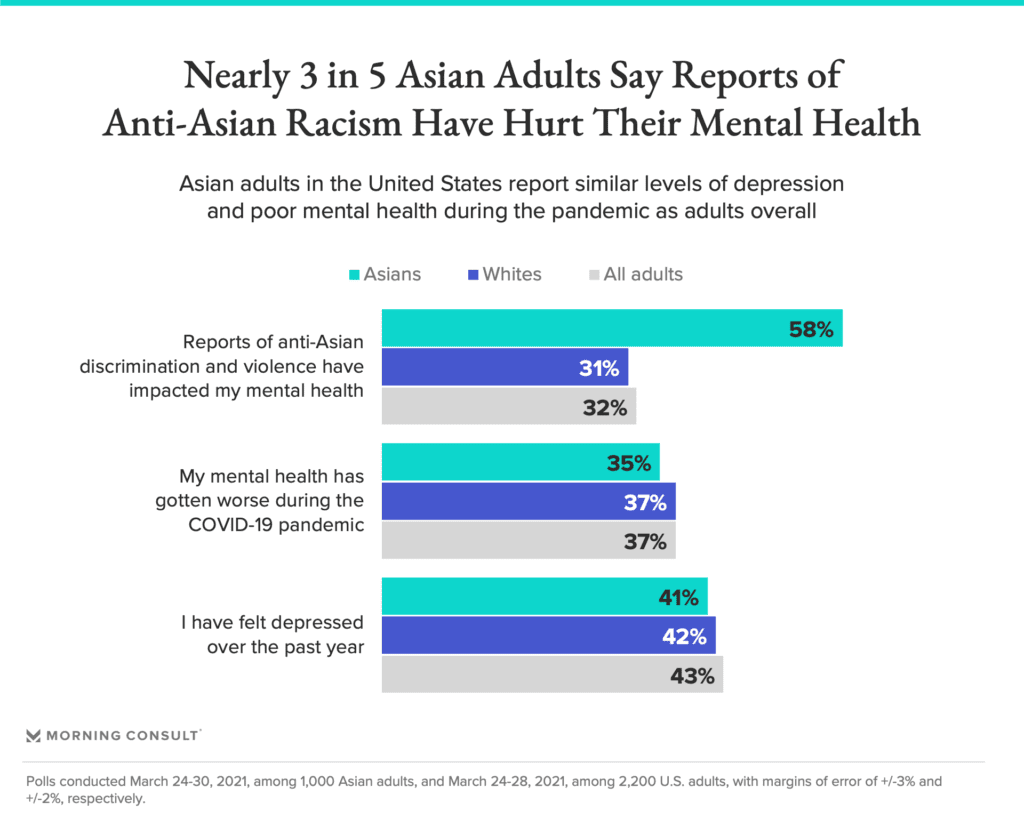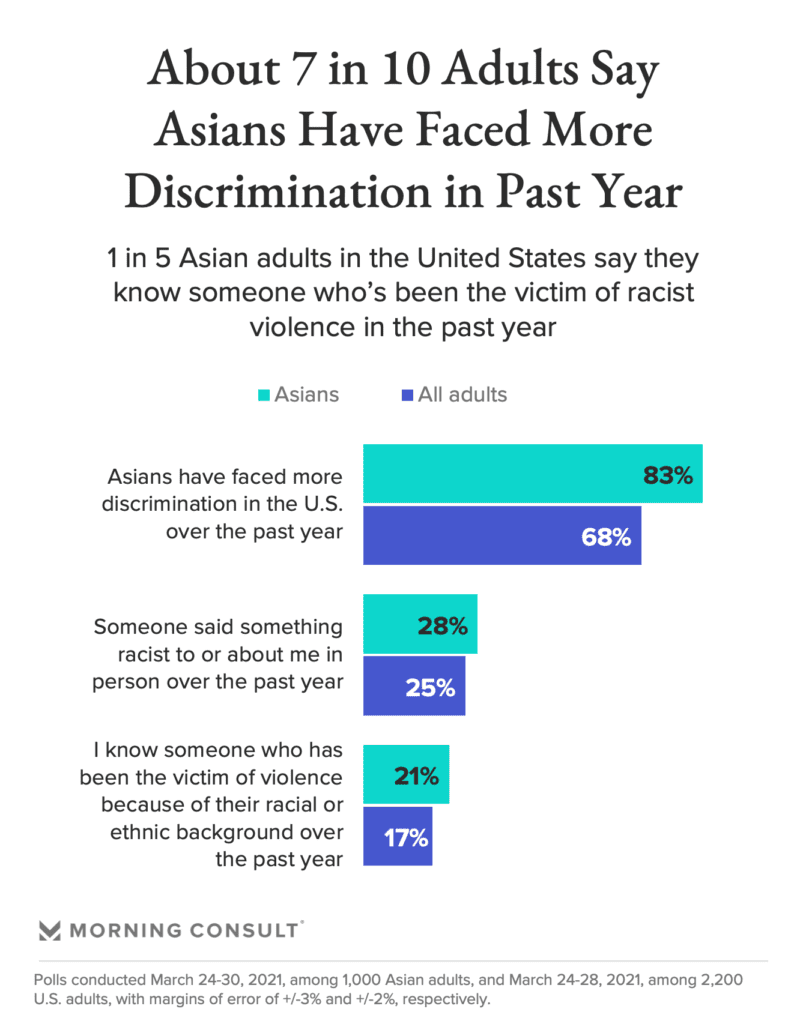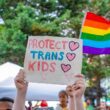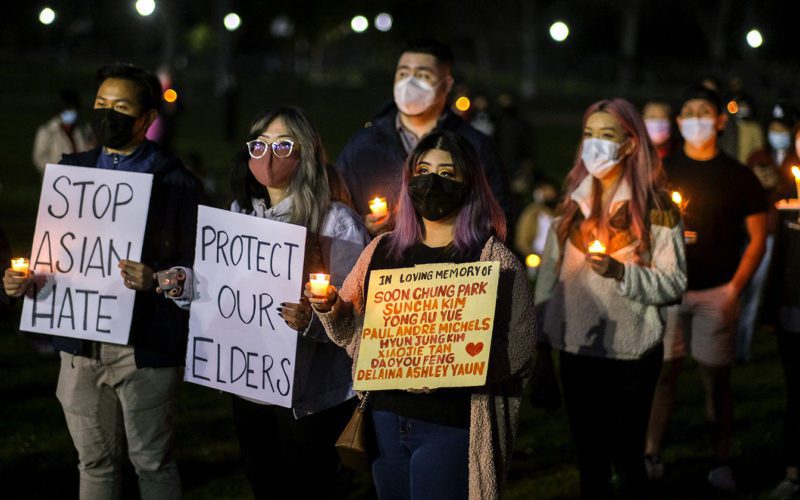Editor’s note: Mental health resources are listed at the bottom of this article.
83% of Asian adults say Asians have faced more discrimination in the U.S. over the last year, while 58% of Asian adults say reports of anti-Asian hate impact their mental health, according to a new poll by Morning Consult.
The survey, conducted after a white gunman killed six Asian women in Atlanta-area shootings, reveals how the yearlong spike in anti-Asian racism has hurt Asian Americans’ mental health. Stop AAPI Hate has tracked nearly 4,000 self-reported incidents of anti-Asian hate since the coronavirus broke out last year.
High-profile cases in recent months include an alleged hate-motivated sexual assault of an Asian woman, the death of an 84-year-old Thai immigrant, and a public encounter during which a perpetrator repeatedly kicked an elderly Filipino woman.
Conducted March 24 to 30 among 1,000 Asian adults in the U.S., the survey found that over one-third said their mental health has gotten worse during the pandemic.
41% of Asian adults said they’d felt depressed over the past year, while 59% said they’d been anxious—figures on par with U.S. adults overall, per Morning Consult. But the results reinforce previous findings that coronavirus-related experiences of racial discrimination are “associated with higher levels of reported generalized anxiety and depressive symptoms.”


The numbers differ across gender lines, however. 66% of Asian women said reports of anti-Asian hate have affected their mental health. That drops to 49% for Asian men. Women are 2.3 times more likely to report hate incidents than men, Stop AAPI Hate reports. A NAPAWF poll conducted in March also found that four out of five (78%) Asian American Pacific Islander (AAPI) women believe racism has “impacted their lives at least a little.”
Much of that is fueled by the COVID-induced shift online, where it’s now easier than ever to come across negative behavior—doxing, harassment, threats, stalking, humiliation. Of Asian adults who have witnessed these interactions, 90% said they think it was because of the targeted person’s race or ethnicity. 73% also said they’ve seen more of this behavior during the pandemic.
But experts say the findings are not the complete picture. The survey was only conducted in English, potentially missing input from Asians who are more vulnerable, such as elders and immigrants. It also does not necessarily capture the diversity of Asian American experiences.


The poll confirms, however, that racism is a “serious public health threat” and must be treated as such, as the Centers for Disease and Control Prevention declared last week.
Though recent reports have highlighted an uptick in help-seeking post-Atlanta attacks, Asians are the least likely racial group to access mental health services.
A 2012 study found that 174 1.5- or second-generation Asian Americans ages 18 to 30 list discrimination as a common source of stress. Others included the stigma around mental health, pressure to live up to the model minority stereotype, family obligations, and difficulty balancing two cultures.
The shortage of Asian American therapists doesn’t help. Asian psychologists comprise about 4% of the profession, while Asians—the fastest-growing racial group in the U.S.—make up about 6% of the population.
When confronted with a non-Asian therapist, Asian clients often run into ignorance. Unable to recognize their signs of mental distress, providers instead minimize their experiences.
Even nationally, racism and microaggressions against Asians remain a “debate”:
- “It’s not that offensive.”
- “Why can’t you take a joke?”
- “You’re overreacting.”
- “You should be grateful the model minority is a positive stereotype.”
Lack of health care, ongoing language barriers, and ignorance of Asian cultures and histories also contribute to hesitancy to access services. If a therapist can’t identify the prisms of the Asian American experience, they cannot hope to help Asians into a place of improved mental health.
Asian American advocacy groups have stepped up to fill the gap. The nonprofit Asian Mental Health Collective maintains a database of Asian therapists for Asian Americans’ ease of access, and the Asian Mental Health Project has taken to hosting Instagram Live sessions to spread awareness about issues that affect Asian Americans’ mental health—like the trauma of hypersexualization.
“Give yourself some time to feel,” Christopher Vo, a Vietnamese American therapist in Houston who co-founded the Asian Mental Health Collective, told the Washington Post one week after the Atlanta shootings. The murders of six Asian women, he added, are “just a reflection of hundreds of thousands of minor interactions that we’ve encountered in all of our lives growing up. Take the time to step away from your workspace, from your friends, if you don’t have the energy. Take the time to grieve.”
Keep an eye out for The Yappie’s deep dive on mental health in Southeast Asian American communities, coming soon.
Mental health resources:
If you are struggling with distressing thoughts, call the National Suicide Prevention Lifeline at 1-800-273-8255 (TALK).
- More at: SpeakingOfSuicide.com/resources.
The NAMI HelpLine can be reached Monday through Friday, 10 a.m. to 8 p.m. Eastern time. Call 1-800-950-NAMI (6264) or email [email protected].
- Text NAMI to 741-741 to receive free, 24/7 crisis support via text message.
Reach the Crisisline at 1-800-273-TALK.
- For assistance in Asian languages, dial 1-877-990-8585.
- Text CONNECT to 741741 to access the Crisis Text Line.
The South Asian Sexual & Mental Health Alliance offers a 24/7 hotline to discuss issues you or a friend are experiencing, as well as provide referrals to local supports.
- SAMHSA’s National Helpline: 1-800-662-HELP (4357) or 1-800-487-4889 (TDD)
- Free and confidential information in English and Spanish for individuals accessible 24/7.
Contact Asian Women’s Center’s 24/7 crisis hotline at 1-877-751-0880.









